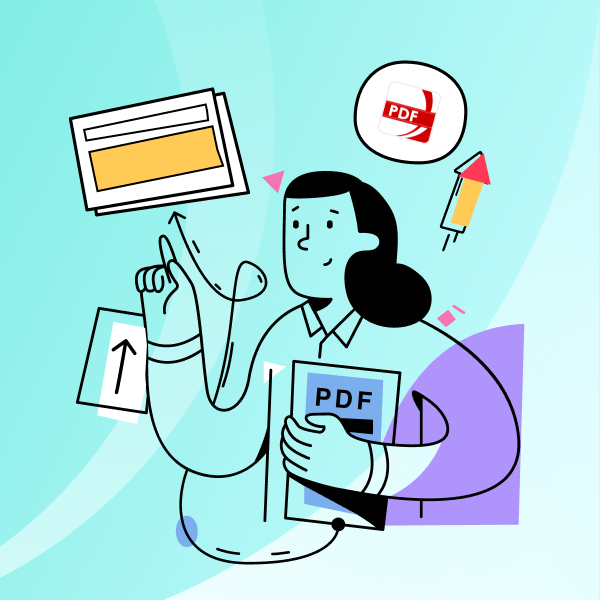Resigning from a job can be a significant step in your career. Whether you're moving to a new job opportunity or simply closing a chapter in your professional life, it's important to leave on a positive note.
This guide will help you write a professional resignation letter, using PDF Reader Pro's customizable templates, such as the "Formal Resignation Letter" and "Simple Resignation Letter PDF Template".
How to Write a Resignation Letter: Key Components
A resignation letter is a formal document that notifies your employer of your decision to leave the company.
It is important to include certain key components to ensure the letter is professional and covers all necessary details.
Heading
The heading should include your contact information, the current date, and the contact information of the person you are addressing the letter to, typically your supervisor or HR manager.
This section should be formatted like a standard letter, making it professional and easy to read.
Salutation
Begin the letter with a formal greeting. Address it directly to your immediate supervisor or the HR manager.
The use of first names is acceptable if you have a close relationship with your supervisor; otherwise, use their full name or last name with an appropriate title.
Statement of Resignation
In the opening paragraph, clearly state that you are resigning from your position. Include your job title and the company's name.
This statement should be direct and unambiguous about your intention to leave.
Example:
"I am writing to formally announce my resignation from my position as [Your Position] at [Company Name], effective [Last Working Day]."
Writing a letter of resignation is a tricky task, but we've got you covered. 👍
Here are our tips for a perfect notice of resignation ✅
Find more tips and advice on our website! ⬇️
🌐 https://t.co/7XypAyQhKm#tips #toptips #help #advice #recruitment #recruiter #careers #work pic.twitter.com/jrd5wsgknz
— Kiwi Recruitment (@KiwiRecruitment) July 20, 2021
Notice Period
Mention your last day of work, adhering to the notice period stipulated in your contract or the company's policy.
This is typically two weeks but can vary based on your role and the company's guidelines.
Example:
"As per the terms of my employment contract, I am providing [two weeks'] notice, with my last day being [Date]."
Reason for Leaving (Optional)
You may choose to provide a brief reason for your departure.
This is optional and should remain positive or neutral.
Refrain from any negative remarks about the company or your colleagues.

Example:
"I have decided to resign to pursue other career opportunities that align more closely with my professional goals."
Gratitude
Express thanks for the opportunities and experiences gained during your tenure at the company.
Highlight any specific experiences or skills you've acquired, as this helps to leave a positive impression.
Example:
"I am grateful for the valuable experiences and the opportunities for professional growth that I have encountered during my time at [Company Name]."
On this day, five years ago, I typed up my letter of resignation because I was feeling defeated and didn’t believe the work I was doing mattered. I prayed on my decision and later that night this post featured on Humans of NY went viral. Nothing beats prayers. pic.twitter.com/a1ROAAi7Br
— Dr. Nadia Lopez (@TheLopezEffect) January 19, 2020
Offer of Assistance
Offer to help with the transition process. This could include training a replacement, completing outstanding tasks, or aiding in the search for a successor.
This shows your professionalism and consideration for the company.
Example:
"I am committed to ensuring a smooth transition and am willing to assist in any way possible during my remaining time here."
Closing
Conclude your letter on a professional note with a formal closing, followed by your signature (if submitting a hard copy) and your typed name.
By including each of these components in your resignation letter, you can ensure a respectful and professional conclusion to your employment.
Example:
Sincerely,
[Your Signature (if sending a hard copy)]
[Your Typed Name]
woo youngwoo's first day of work, and first resignation letter
cr to artist 정5 pic.twitter.com/xzGR7N9YfE
— typedmaru 🏝️ (@typedmaru) July 8, 2022
Learn how to craft a professional resignation email with our easy-to-follow tips, ensuring a smooth transition from your current role.
Resignation Letter PDF Templates
PDF Reader Pro offers two essential templates to simplify this process.
Discover how to write a compelling personal statement with our guide, designed to make your application stand out.
Formal Resignation Letter Template
Ideal for those holding a significant position or those who have been in the company for a long time.
This template emphasizes professional relationships and a formal tone.
How to Write a Resignation Letter: Best Practices
Crafting a resignation letter is a significant step in your career transition. It's not just a formal document but a reflection of your professionalism and respect towards your current employer.

Here are some best practices to consider when writing your resignation letter:
-
Start with a Clear Statement of Resignation: Your letter should open with a straightforward statement of resignation. This is where you formally announce your intent to leave, making it clear and unambiguous.
Example: "I hereby submit my resignation from my position as [Your Position], effective [Date]."
-
Notice of Resignation: It’s customary to give at least two weeks' notice in advance of your final day of employment. This shows respect for your employer and allows time for a smooth transition.
-
Keep it Simple and Professional: A well-written resignation letter should be concise and to the point. Use a polite and professional tone throughout the letter, even if your experiences weren’t entirely positive.
-
Mention Valuable Experiences and Professional Growth: Express gratitude for the opportunities the company has provided you. Mention any valuable experiences, learning, or professional growth that you have gained during your tenure.
Example: "I am grateful for the valuable experiences and professional growth I have gained at [Company Name]."
-
Address it to Your Current Manager: Direct the letter to your current manager or the person responsible for the resignation process in your company. Personalizing the letter shows respect and professionalism.
-
Be Positive About Future Endeavors: Wish the company well and express hope for its future success. This helps in leaving a lasting positive impression.
-
Use a Resignation Letter Sample for Reference: If you’re unsure where to start, look at sample resignation letters for guidance. Google Docs and other online resources offer templates that can be a good starting point.
-
Include the Date Your Resignation is Effective: Clearly state the day your resignation will be effective, aligning with the notice period you are providing.
-
Maintain an Appreciative Tone: Regardless of the reasons for your departure or the company culture, it’s important to maintain an appreciative and positive tone.
-
Consider Company Culture in Your Approach: If your company has a specific protocol for resignations, make sure to adhere to it. This might include how the letter is submitted – whether in print or via email.
-
Focus on a Thoughtful Conclusion: End your letter on a positive note, thanking the company for the opportunity and expressing your wish to keep in touch.
-
Professional Tone Throughout: From the salutation to the sign-off, maintain a professional tone. This includes avoiding slang, overly casual language, or any negative comments.
-
Polite Resignation Letter Reflects Well on You: Remember that a polite resignation letter can be a tool for networking in the future. It reflects your character and can be used for future reference.
By adhering to these best practices, your resignation letter will serve not just as an official resignation document, but as a testament to your professionalism and positive approach to career transitions.
Remember, a thoughtful resignation letter can leave a lasting positive impression on your employer and pave the way for future endeavors.
Discover how to write a concise contract acceptance letter with our quick guide.
How to Write a Resignation Letter: FAQ
What should be included in a well-written resignation letter?
A well-written resignation letter should include your statement of resignation, the date your resignation is effective, a brief mention of the reason for leaving (if you choose to include it), an appreciative tone for the time spent at the company, and a professional tone throughout. It's also helpful to offer assistance with the transition of ongoing projects.
How can a letter of resignation affect future employment opportunities?
A thoughtful and polite resignation letter can positively impact future employment opportunities. It helps maintain professional relationships and can lead to positive references. The way you handle your resignation can speak volumes about your character and professionalism to future employers.
Is it necessary to provide a reason for resignation in the official resignation letter?
While providing a reason in your official resignation letter can be helpful, it is not mandatory. If you choose to include a reason, keep it brief and focus on positive or neutral aspects, especially if it's due to personal or family reasons. Avoid mentioning any negative reasons for leaving.
How much advance notice should be given when resigning?
Ideally, you should provide advance notice of at least two weeks when resigning. However, this may vary based on your position, the company's policy, or if your employment contract specifies a different period. Advance notice is crucial to maintain a positive tone and to assist with the resignation process.
Can a resignation letter impact the final day of employment?
Yes, the day of employment will often be determined based on the effective date of resignation mentioned in your letter. This is why it's important to be clear and precise about the date when your resignation will take effect.
Should personal details be included in a resignation letter?
A resignation letter should focus on the professional aspects of your departure. Personal details are not necessary and should generally be omitted to maintain a professional tone. Your contact details can be included in the heading for future correspondence.
How important is the tone of a resignation letter?
The tone of your resignation letter is extremely important. An appreciative, positive, and professional tone helps ensure a smooth transition and maintains good relationships with your current employer. This is crucial for securing positive references and leaving a wonderful experience behind.
Can a resignation letter be used as a career opportunity?
While the primary purpose of a resignation letter is to notify your employer of your departure, it can indirectly present a career opportunity. A well-crafted letter that speaks to your professionalism and the positive experiences gained can resonate with future employers or colleagues.











 Free Download
Free Download  Free Download
Free Download 




